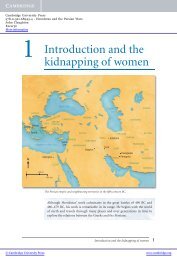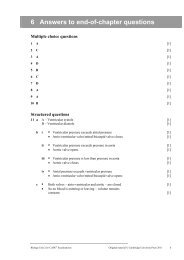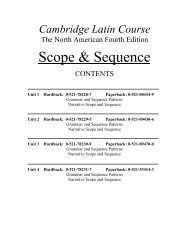Brad Philpot - Cambridge University Press
Brad Philpot - Cambridge University Press
Brad Philpot - Cambridge University Press
Create successful ePaper yourself
Turn your PDF publications into a flip-book with our unique Google optimized e-Paper software.
Text 6.4 The Collector, John Fowles, 1963<br />
John Fowles was the son of a veteran of the First World War. He was gifted in<br />
languages and athletics, which became apparent while he was at Bedford School<br />
during the years of the Second World War. He completed his navy officer training<br />
on Victory in Europe Day in 1945. In 1947, after two years of military service, he<br />
went to Oxford <strong>University</strong> to study French. In 1947 he wrote: I … began to hate<br />
what I was becoming in life – a British Establishment young hopeful. I decided instead to<br />
become a sort of anarchist. He was interested in Albert Camus, Jean-Paul Sartre and<br />
the ideas of existentialism. After leaving university he taught in Greece but he<br />
quarrelled with the school. He returned to England, got married and was teaching<br />
English as a foreign language when he wrote The Collector. The story is about a<br />
young man, Frederick Clegg, who kidnaps a young girl, Miranda Grey. The story<br />
is told twice, from the perspective of each of the characters. The extract below<br />
contains the very last lines of the novel. They are told by Frederick after Miranda<br />
has died of pneumonia.<br />
The days passed, it is now three weeks since all that.<br />
Of course I shall never have a guest again, although now Aunt Annie and<br />
Mabel have decided to stay Down Under, it would not be difficult.<br />
Still as a matter of interest I have since been looking into the problems there<br />
would be with the girl in Woolworths. She lives in a village the other side of Lewes<br />
from here, in a house a quarter mile or so from the bus-stop. You have to go<br />
along a country-lane to get to it. As I say, it would be possible (if I hadn’t learnt my<br />
lesson). She isn’t as pretty as Miranda, of course, in fact she’s only an ordinary<br />
common shop-girl, but that was my mistake before, aiming too high, I ought to<br />
have seen that I could never get what I wanted from someone like Miranda, with<br />
all her la-di-da ideas and clever tricks. I ought to have got someone who would<br />
respect me more. Someone ordinary I could teach.<br />
She is in the box I made, under the appletrees. It took me three days to dig<br />
the hole. I thought I would go mad the night I did it (went down and got her in the<br />
box I made and outside). I don’t think many could have done it. I did it scientific.<br />
I planned what had to be done and ignored my natural feelings. I couldn’t stand<br />
the idea of having to look at her again, I once heard they go green and purple in<br />
patches, so I went in with a cheap blanket I bought in front of me and held it out<br />
till I was by the bed and then threw it over the deceased. I rolled it up and all the<br />
bedclothes into the box and soon had the lid screwed on. I got round the smell<br />
with fumigator and the fan.<br />
The room’s cleaned out now and good as new.<br />
I shall put what she wrote and her hair up in the loft in the deed-box which<br />
will not be opened till my death, so I don’t expect for forty or fifty years. I have<br />
not made up my mind about Marian (another M! I heard the supervisor call her<br />
name), this time it won’t be love, it would just be for the interest of the thing and<br />
to compare them and also the other thing, which as I say I would like to go into<br />
in more detail and I could teach her how. And the clothes would fit. Of course<br />
I would make it clear from the start who’s boss and what I expect.<br />
But it is still just an idea. I only put the stove down there today because the<br />
room needs drying out anyway.<br />
Chapter 6 The context of composition<br />
Key<br />
term<br />
Existentialism is the philosophy<br />
that individuals are responsible for<br />
defi ning their own existence and<br />
giving their life meaning. Existential<br />
literary works often include troubled<br />
protagonists who question the<br />
meaning of life.<br />
Figure 6.4 John Fowles (1926–2005). He<br />
once wrote, I ... began to hate what I was<br />
becoming in life … I decided instead to<br />
become a sort of anarchist.<br />
Sample<br />
© <strong>Cambridge</strong> <strong>University</strong> <strong>Press</strong> 2011<br />
discussion<br />
1 Find evidence of the three<br />
characteristics of modernism in<br />
Text 6.4.<br />
2 How does the narrator draw you<br />
into his world?<br />
3 What kind of person is the<br />
narrator? Give examples to<br />
illustrate your ideas.<br />
4 How does Text 6.4 refl ect John<br />
Fowles’s interest in modernism<br />
and anarchy?<br />
145








